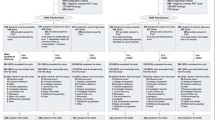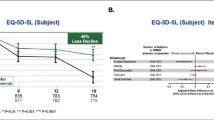Summary
In studies on the efficacy of antidementia drugs, a delay in symptom progression was often postulated on the basis of a comparison of the change upon treatment and an assumed "natural" progression. Such comparisons were usually based on the cognitive subscore of the Alzheimer's Disease Assessment Scale (ADAS-cog), using either the drug–placebo differences after randomized treatment or the changes upon active drug treatment in open-label extension studies. Considering quality of life, competence, cost of care, and economics of therapeutic measures, a delay in the progression of dependency and need of care appears to be more relevant than a delay in cognitive abilities not directly related to activities of daily living. Therefore, for dementia patients treated with the Ginkgo special extract EGb 761®, the delay in loss of capacities needed to cope with the demands of daily living was estimated, based on the Geriatric Evaluation of Relative's Rating Instrument (GERRI). The drug–placebo differences documented after 26 and 52 weeks of treatment corresponded to a delay in progression by 10 and 21 months, respectively. Regarding the subgroup with dementia of the Alzheimer type, the estimated delay was 16 and 25 months, respectively. It could thus be shown that by treatment with EGb 761® the progression of dependency and need of care can be slowed down, which may have an impact on costs for care, e.g., by delaying nursing home placement.
Zusammenfassung
In Studien zur Wirksamkeit von Antidementiva wurde eine Verzögerung der Progression der Krankheitssymptomatik häufig aus einem Vergleich der Veränderung unter Behandlung mit einer angenommenen "natürlichen Progression" abgeleitet. Vorzugsweise wurden solche Vergleiche auf den kognitiven Subscore der Alzheimer's Disease Assessment Scale (ADAS-cog) gestützt, wobei entweder die Verum-Plazebo-Differenzen nach randomisierter Behandlung oder die Veränderungen unter Verumbehandlung nach offener Fortsetzung der Studien herangezogen wurden. Unter den Gesichtspunkten Lebensqualität, Kompetenz, Kosten für Pflege und Betreuung und Ökonomie therapeutischer Maßnahmen erscheint jedoch die Verzögerung der Progression von Abhängigkeit und Pflegebedürftigkeit relevanter als die von nicht unmittelbar mit Alltagskompetenz verknüpften kognitiven Testleistungen. Es wurde deshalb für mit Ginkgo-Spezialextrakt EGb 761® behandelte Demenzpatienten die Verzögerung des Verlustes von Fähigkeiten zur Bewältigung der Anforderungen des täglichen Lebens, gemessen mit dem Geriatric Evaluation by Relative's Rating Instrument (GERRI), geschätzt. Die nach 26 bzw. 52 Behandlungswochen dokumentierten Verum-Plazebo-Unterschiede entsprachen einer Verzögerung der Progression um 10 bzw. 21 Monate, für Patienten mit Demenz vom Alzheimer-Typ (DAT) sogar 16 bzw. 25 Monate. Damit konnte gezeigt werden, dass durch Behandlung mit EGb 761® das Fortschreiten von Abhängigkeit und Pflegebedürftigkeit verzögert werden kann, was sich günstig auf die Kosten für Pflege und Betreuung, z. B. durch spätere Pflegeheimeinweisung, auswirken dürfte.
Similar content being viewed by others
Author information
Authors and Affiliations
Corresponding author
Rights and permissions
About this article
Cite this article
Haan, J., Hörr, R. Delay in progression of dependency and need of care of dementia patients treated with Ginkgo special extract EGb 761® . Wien Med Wochenschr 154, 511–514 (2004). https://doi.org/10.1007/s10354-004-0116-6
Issue Date:
DOI: https://doi.org/10.1007/s10354-004-0116-6
Keywords
- Ginkgo biloba
- EGb 761®
- Dementia
- Alzheimer's disease
- Vascular dementia
- Activities of daily living
- Geriatric Evaluation of Relative's Rating Instrument




